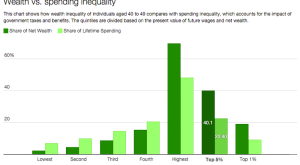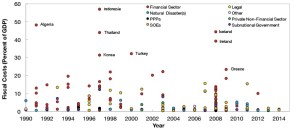In his blog, John Cochrane discusses plausible features of habit models (that some other models share): Consumption moves more with income in bad times. In bad times, consumers start to pay inordinate attention to rare bad states of nature. [The habit model] also gives a natural account of endogenous time-varying attention to rare events.
Read More »Spending Inequality
In a New Republic blog, Alan Auerbach and Larry Kotlikoff discuss lifetime spending inequality. Due to taxes and income variability over the life cycle, this is much smaller than wealth or income inequality. Auerbach and Kotlikoff write: The top 1 percent of 40-49 year-olds face a net tax, on average, of 45 percent. … For the bottom 20 percent, the average net tax rate is negative 34.2 percent. … Our standard means of judging whether a household is rich or poor is based on current income....
Read More »Stiff Competition for Brokerage Firms
The Economist reports about the “ostensibly free online services” provided by Robinhood, a share-trading app. Instead of taking commissions from customers, Robinhood receives them from the trading venues to which it steers their orders, a controversial but common practice. It also earns returns from the cash clients leave in their accounts, and plans soon to offer margin trading—the buying of stock with borrowed money—for which it will charge a fee. Earlier posts on fintech.
Read More »Contingent Liabilities
On VoxEU, Elva Bova, Marta Ruiz Arranz, Frederik Toscani and Elif Ture discuss contingent liabilities. Their figure 2 illustrates contingent liability realizations by type and year:
Read More »I Would Like to Withdraw A Couple Billion Swiss Francs: Legal Aspects
On his blog, Urs Birchler offers different perspectives on the question whether the Swiss National Bank (SNB) is obliged to pay out banks’ reserves in cash. One view: Reserves are legal tender. The SNB therefore is not obliged to exchange reserves against cash. Another view: According to the law, the SNB is required to provide sufficient cash. Moreover, reserves and cash were meant to be perfect substitutes. Yet another view: Lawmakers would have written a different law had they known that...
Read More »Ethereum
Ethereum is a decentralized platform that runs smart contracts: applications that run exactly as programmed without any possibility of downtime, censorship, fraud or third party interference. These apps run on a custom built blockchain, an enormously powerful shared global infrastructure that can move value around and represent the ownership of property. This enables developers to create markets, store registries of debts or promises, move funds in accordance with instructions given long in...
Read More »Liquidity Trap Kills Liquidity Effect
In his blog, John Cochrane registers disagreement with Larry Summers and reiterates his own argument that in a liquidity trap, interest rate policy does not have a liquidity effect and thus, only a long-run “expected inflation” or “Fisher” effect: When the liquidity effect is absent, the expected inflation effect is all that remains. Inflation must follow interest rates.
Read More » Swiss Economicblogs.org
Swiss Economicblogs.org


